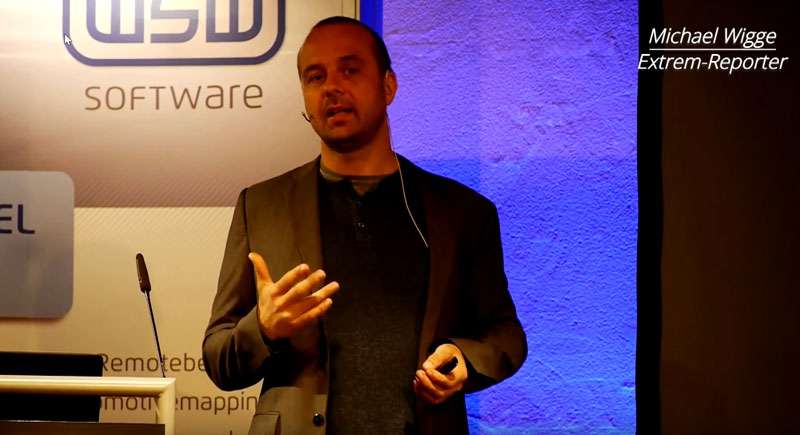Courses on Intercultural Training
Inclusion & Diversity with Michael Wigge in 2026
Are you seeking intercultural training, workshops or courses for your employees or your leadership team? We offer individually designed training programs to prepare your workforce for a globalized, digitized, and fast-changing market.
Have you experienced challenges with your workforce regarding intercultural and international work processes? Has your leadership team felt challenged by unexpected changes? CMW and head coach Michael Wigge specialize in supporting the corporate workforce through courses that offer information about:
- A better understanding of cultural and global differences in the work context
- Overcoming prejudices and misunderstandings regarding different cultural values
- Mediating intercultural differences between parties with our CMW program
- Helping lead intercultural teams locally and internationally without challenging obstacles
Michael has traveled to 95 countries in his lifetime, published four motivational books dealing with intercultural issues, and has lived in Germany and the UK before moving to the United States in 2013.
Michael gained popularity in the United States when he published the international bestseller How to Travel the World for Free, sharing the intercultural challenge he faced. The story was published as a book and produced as a TV Show on PBS. These publications led to appearances of the intercultural trainer on The Tonight Show and on The Today Show.
Table of Content:
Our Intercultural Training Courses & Workshops:
- Leadership styles in the International and global context
- Conflict management and challenges between cultures
- Digital leadership with employees overseas
- Sensitivity soft skills training to overcome cross-cultural prejudices
- Intercultural understanding through empathy, communication, and tolerance
- Diversity competence and skills training
Intercultural Training Courses & Workshops – Our 6 Keys
1. Our Courses Develop Intercultural Competence
One of the primary objectives of our work is to develop intercultural competence among employees. This competence allows individuals to effectively communicate, collaborate, and build relationships across cultural boundaries. Through learning sessions, participants can gain a deeper understanding of cultural differences, norms, values, and communication styles. They learn to appreciate diversity and develop the skills to navigate cultural nuances, thereby minimizing misunderstandings and conflicts that may arise in multicultural workplaces.
2. Our Training, Workshops & Courses to Embrace Inclusion
By sharpening the view on diversity in a corporate setting, our seminars helps organizations embrace the value of different perspectives and experiences. It encourages employees to recognize and appreciate the richness that diversity brings to the table, ultimately fostering creativity, innovation, and problem-solving capabilities within teams.
Moreover, our intercultural training, workshops and courses cultivate a sense of belonging and inclusion, creating an environment where individuals feel valued and respected regardless of their cultural backgrounds.
3. Exploring Cultural Differences Around the Globe
Cultural differences are evident in major parts of the world, and intercultural work provides a platform to explore these differences in depth. It highlights the unique cultural attributes and business practices of various countries and regions, enabling employees to navigate cross-cultural interactions more effectively.
Participants gain insights into how cultural dimensions such as individualism versus collectivism, high versus low power distance, or direct versus indirect communication styles influence workplace dynamics. This knowledge enhances their ability to adapt and collaborate with colleagues from diverse cultural backgrounds.
4. Avoiding Misunderstandings & Developing Empathy
Intercultural courses, workshops, and training also address typical differences and misunderstandings that can arise when working with employees from different cultures and countries.
They promote open dialogue, empathy, and active listening, enabling individuals to bridge cultural gaps and establish effective communication channels. By encouraging participants to reflect on their own cultural biases and assumptions, the training fosters self-awareness and promotes cultural sensitivity, leading to better teamwork and cooperation.
5. Our Intercultural Training with Michael’s Keynote
A notable addition to our seminars can be Michael’s keynote presentation. As an experienced traveler, he has visited about 100 countries. His intercultural experiences offer unique insights into the challenges and opportunities of navigating diverse cultural landscapes. Through engaging storytelling and firsthand accounts, Michael can inspire participants to embrace cultural diversity, challenge their own preconceptions, and cultivate a global mindset.
6. 5 Aspects of Diversity of Our Intercultural Workshops
Diversity encompasses various dimensions, and our seminars acknowledge five key areas of diversity: cultural diversity, racial diversity, gender diversity, physical disabilities, and diversity in interests. By focusing on these areas, our work promotes a holistic understanding of diversity and fosters an inclusive environment that respects and celebrates individual differences.
Cultural diversity recognizes the multitude of cultural backgrounds present in the workplace and encourages mutual respect and understanding. Racial diversity emphasizes the importance of equal opportunities and addresses racial biases and discrimination. Gender diversity promotes gender equality and inclusivity, challenging stereotypes and fostering a balanced workforce.
Physical disabilities highlight the importance of accessibility and accommodations for individuals with disabilities. Lastly, diversity in interests acknowledges that diverse hobbies, passions, and perspectives contribute to a vibrant and innovative work culture.



6 Intercultural Arguments for Our Training Courses & Workshops
1. Overcoming Intercultural Differences
CMW has delivered training to the workforce and leadership teams across the US, Canada, and German-speaking countries in Europe for more than six years. Our head coach lives and breathes the subject matter of intercultural understanding in his own life as a German citizen and US permanent resident. Michael travels across cultures to deliver keynotes, seminars, and workshops to international companies.
CMW’s corporate clients experience a great learning curve and success by handling intercultural differences with understanding and a different point-of-view strategy. We’ve managed to shift many intercultural conflicts within organizations to reach an agreement on both sides with improved teamwork and productivity results. A typical CMW course creates specific and unique cross-cultural awareness toward colleagues, teams, and clients abroad.
2. Different-Point-Of-View-Strategies
Our clients learn through the following formats:
- One-day training
- Two-day training
- Online training
The intercultural training, workshops and courses allow our clients to learn to view an intercultural (conflict) situation from different angles, for example:
Mr. Peters leads a production team of 30 employees based in different Asian and European countries. He leads digitally and regularly sets up digital team meetings and one-on-one employee calls. But they feel significantly challenged that employees from one production team in Country XY need help to follow up on their agreements.
They write emails to their local leadership team to ensure they’re understood but need help figuring out why they can’t get through to the workforce overseas. Mr. Peters gets extraordinarily frustrated and becomes upfront in his communication style. But the consequences of this change lower the productive outcome of the production team.
3. Different-Point-Of-View-Strategies – Part 2
Participating in our seminars, Mr. Peters gets an understanding of the following:
- The typical leadership style in Country XY
- The communication style between people in that particular culture
- How the workforce perceives him in terms of unusual cultural actions and behavior
- How culture XY communicates in a corporate setting
- Taboos and values in the culture of his production team
- How production processes move forward in that Country
These bulletin points enable Mr. Peters to adjust his communication with the region and avoid frustration, lack of productivity, conflict, and inappropriate behavior. At the same time, his production team overseas feels understood and encouraged to higher productivity.
After the intercultural work, Mr. Peters decided to book one-on-one online coaching sessions with a CMW trainer and learn how to turn the troubled intercultural relationship into an exciting learning process for both sides.
CMW also offers an online and onsite training opportunity for the overseas workforce to better understand and interact with their US leadership team.
4. A Typical Intercultural Misunderstanding
Mrs. Bates leads a team in a significant company in Ohio with a diverse workforce. 40% of her workers are from the US, and another 30% are from Latin American and Asian countries. The additional 30% work remotely from India and Thailand for her team. She usually sets up team meetings once a month. The conference is held onsite and online through WebEx to get everyone together. Every time the session runs, Mrs. Bates feels frustrated because a few employees—and somehow always pretty much the same people—tend to join the meeting five to ten minutes late.
This situation happens onsite in her team meeting room and online via WebEx. These participants don’t even seem to be apologetic. They seem to check in late and do not care about it. Mrs. Bates and other American employees feel highly disturbed and see this behavior as disrespectful.
When CMW gave a two-day training to the division, team members questioned why some people constantly acted rudely. Mrs. Bates asked if there was an intercultural difference she didn’t know about. During the training, we managed to get a hold of the ‘late people’ and allowed them to talk about their cultural understanding of punctuality.
5. A Typical Intercultural Misunderstanding – Part 2
They shared that in their culture, it’s appropriate not to join the meeting absolutely on time because it could put the leadership team under pressure to start absolutely on time. For them, it was polite to check in five+ minutes later and show no sign of remorse because of their cultural background. They shared in our intercultural training that they know meetings and appointments to be loose forms of checking in one after another. They also shared with us that they never had intercultural training before working for a US employer.
Mrs. Bates could share her and the American point of view with these international workers combined with new rules for future meetings. The group concerned was very appreciative and showed gratitude that they finally had a chance to understand why Mrs. Bates sometimes comes across as so distant and reserved, especially during and after team meetings.
One year later, the productivity of Mrs. Bates’s division rose by 15%. They started finding many more aspects of intercultural misunderstanding and worked it out within their team meetings as a significant monthly point of discussion.
6. Client Testimonials of Our Intercultural Training, Workshops & Courses
“We overcame most of our misunderstandings and conflicts due to the intercultural training.”
“Thanks, Michael, for helping us. The team spirit is way better after you helped us come together.”
“10-15% rise of productivity due to intercultural understanding – well done, thanks!”
“Our company has its headquarters in Philadelphia, but about 40% of our workforce are from Mexico, Peru, India, the Philippines, and European countries like France and Germany. Interactions between cultures have led to major issues due to misunderstandings and conflicts. We’re still in the intercultural workshops & courses with CMW and see the light at the end of the tunnel. Great work, guys! Thanks.”
Links: Online Employee Training; Online Leadership Training; Motivational Training; Speaker Germany
FAQ – Do You also Offer Intercultural Training Courses Online?
Yes! Our intercultural training courses are held onsite and online.
FAQ – What are the Group Sizes of your Workshops?
Our intercultural training courses usually have up to 10 participants depending on the clients’ needs.
Michael’s 2026 Motivational Tour
March 2026
Boulder, USA
May 2026
Flagstaff, USA
June 2026
Asheville, USA
September 2026
Freiburg im Breisgau, Germany
October 2026
Innsbruck, Austria


‘With the right strategy, you can achieve any goal’ – MICHAEL WIGGE





